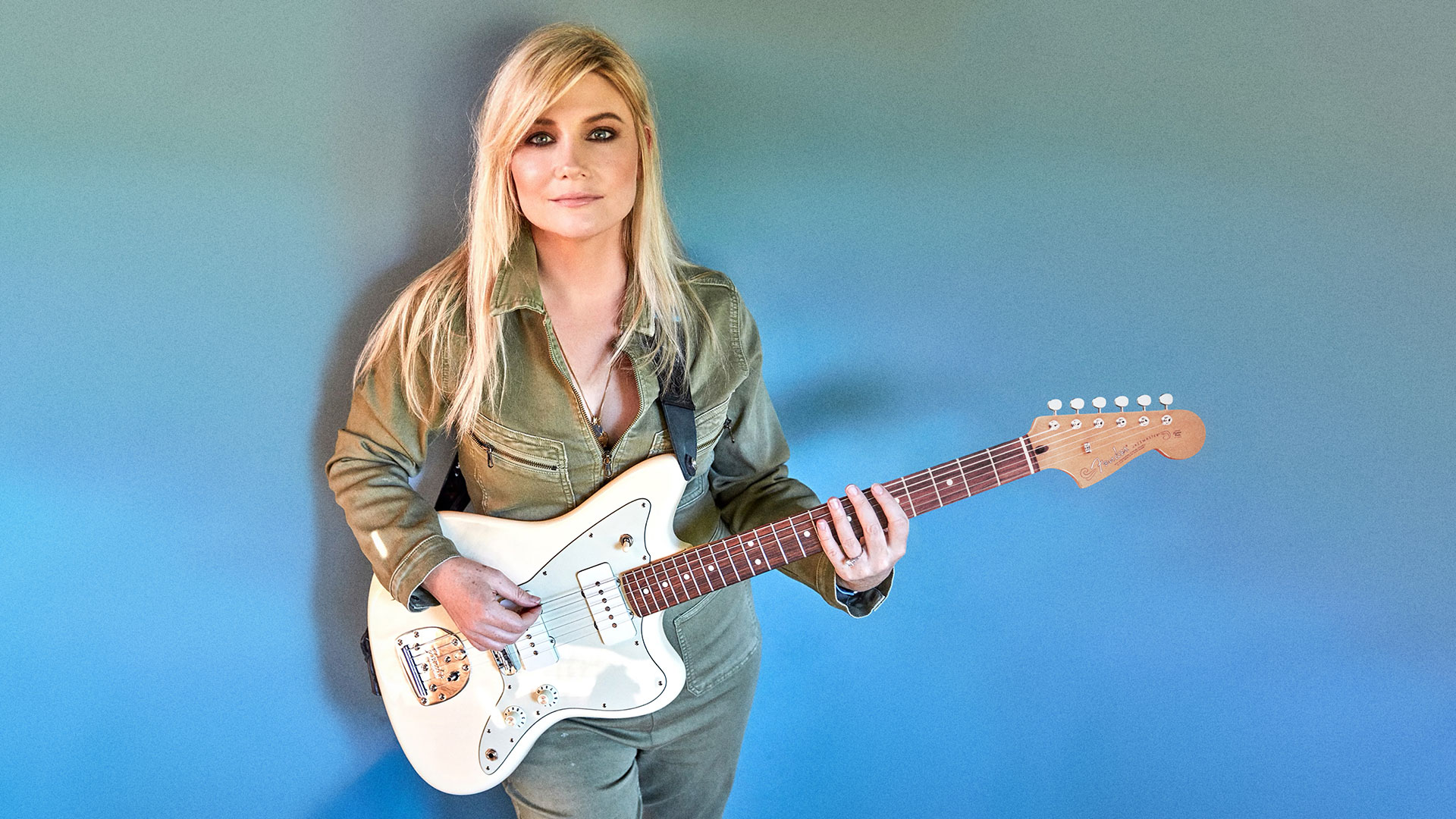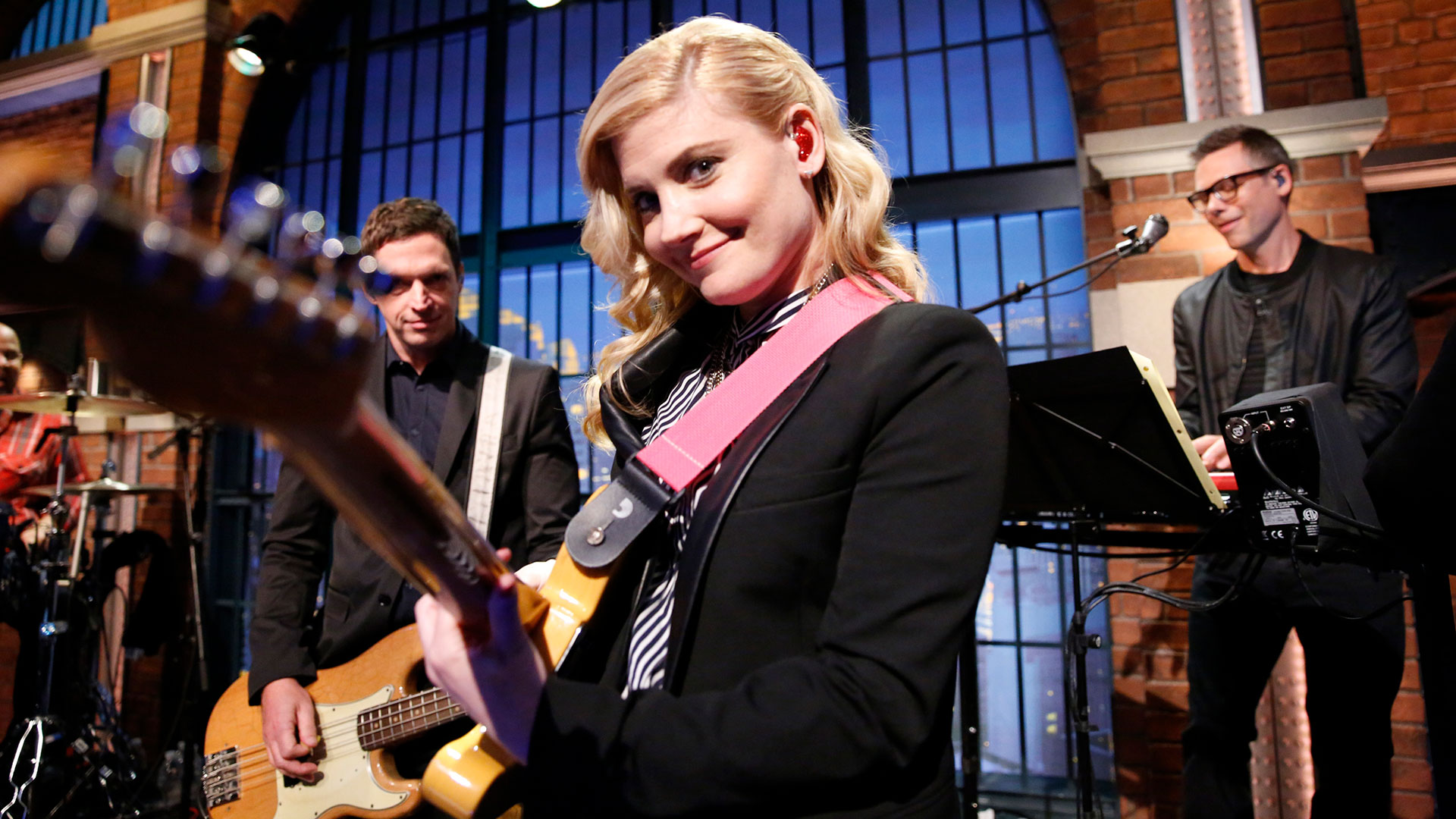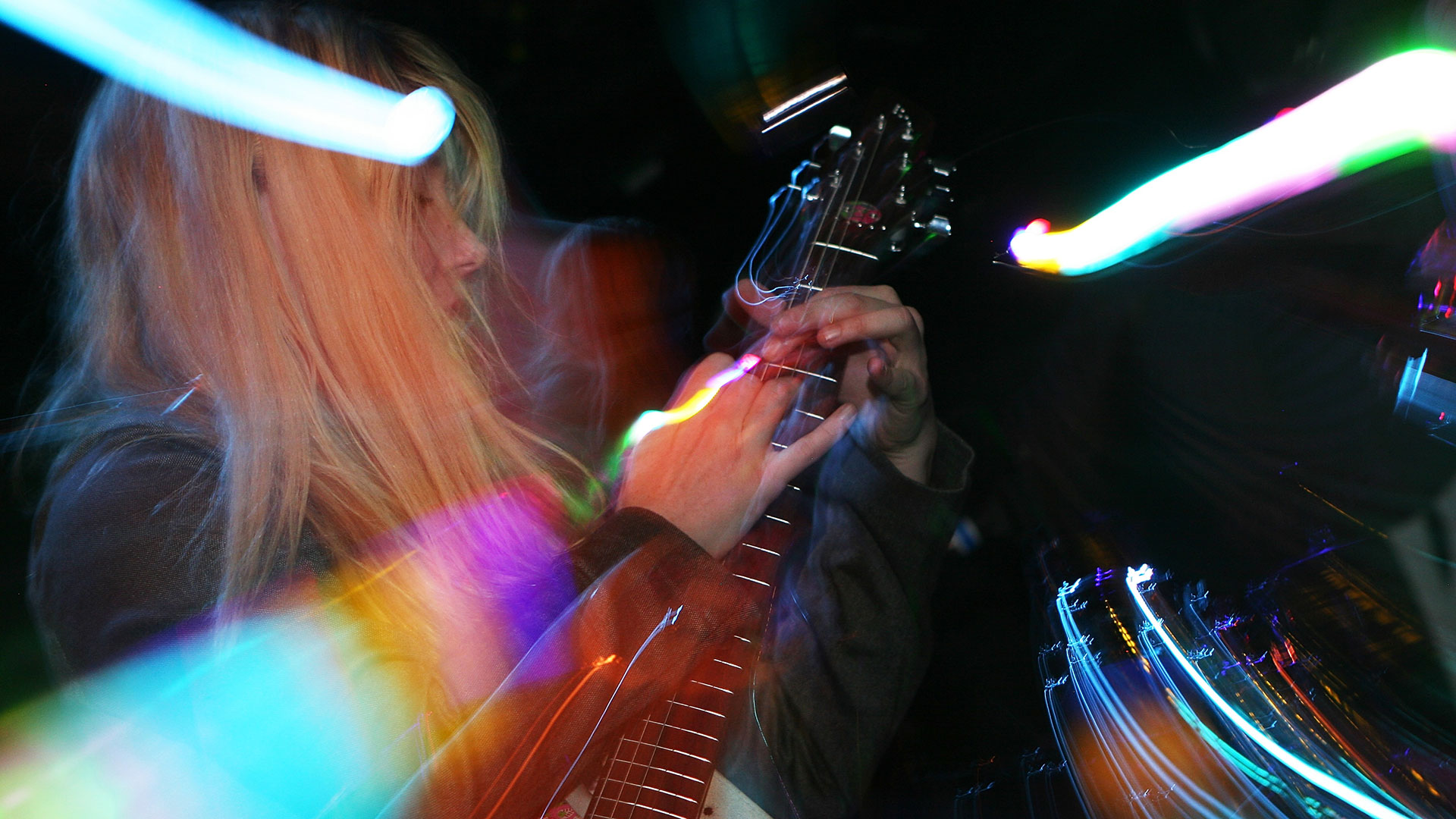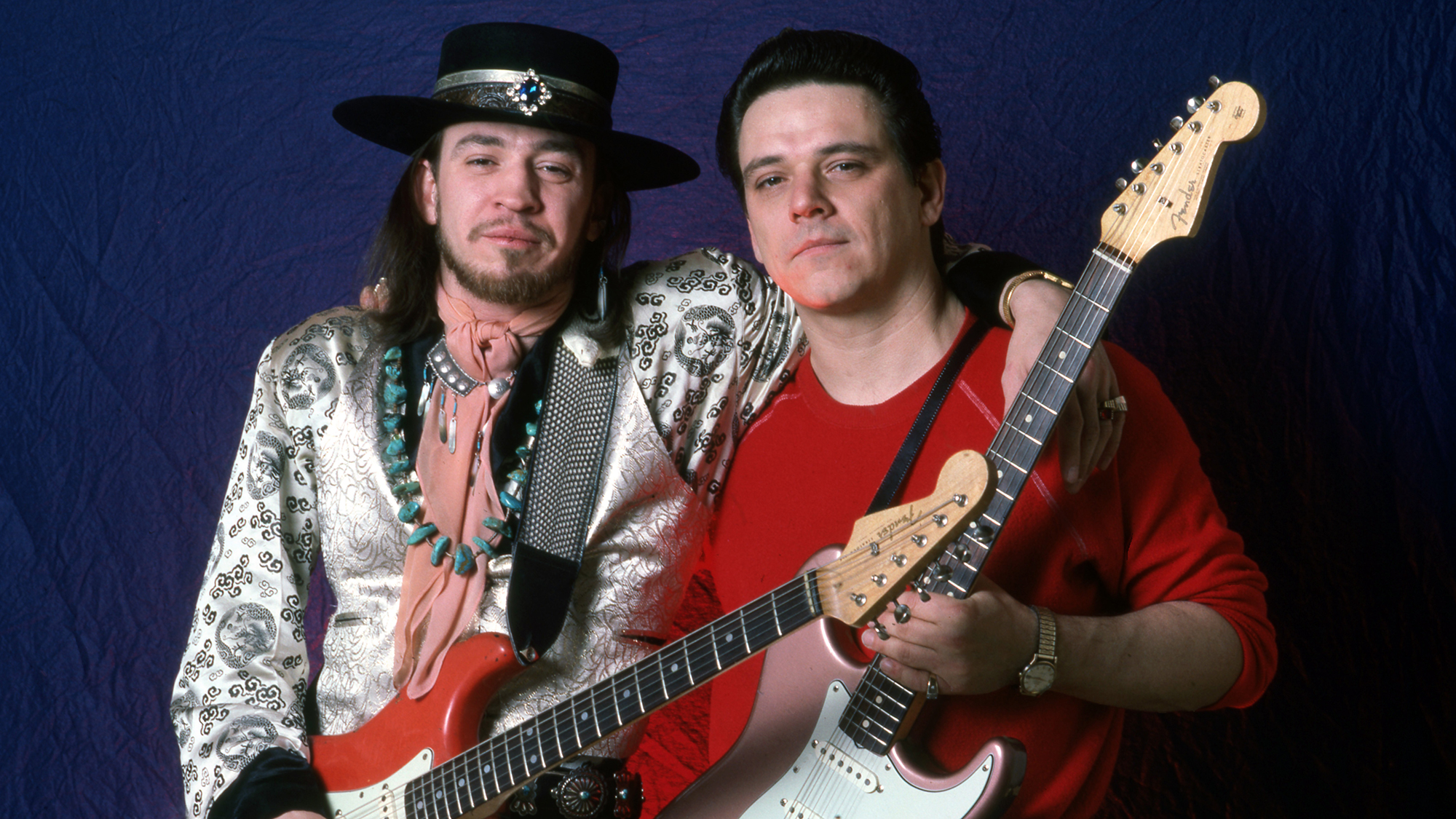“As a tapping player, you don’t want to be thought of as Yngwie Malmsteen. You wanna show the broken, punk-rock ‘Oops-my-finger-slipped-there-whatever’ sloppiness”: Marnie Stern is back to make math rock scrappy again
After a 10-year stint playing in front of millions as the house guitarist on Late Night with Seth Meyers, the queen of two-hand tapping has returned – and not before time

10 years ago, Marnie Stern resided near the top of a pile of players that – following the vacuum of early-00s ‘landfill indie’ – redefined the role of the alternative guitar player.
In doing so, she set something of a template for the current generation of math-rock virtuoso wunderkinds, lawlessly intersplicing genres, time signatures and blazing two-hand tapping techniques into two-minute maelstroms. However, unlike today’s digital native guitar heroes, she did it with a punk-rock scrappiness that you rarely hear from such technical players.
After 2013’s Chronicles Of Marnia, though, she stopped releasing new music. What followed was a decade spent hiding in plain sight, as the house guitarist on Late Night with Seth Meyers – and somehow, amid the nightly gigs, having a family.
“I played every day,” she tells GW. “We wrote eight to 10 songs a day. But it wasn't necessarily my style of playing. So it was a strange thing, to be connected to the instrument and playing every day, but it became more of my job. It was work.”
10 years passed in a blur. God knows how many millions of people must have seen and heard her guitar playing during that time, but eventually the desire to get back to her own writing took over and she took the plunge – giving up “as good of a job as you could wish for” to make her own music once more.
The result is her first album in a decade: The Comeback Kid. From the opening notes, though, it sounds like less of a comeback and more of an exuberant liberation – and it is packed to the gills with colorful, ferocious and fun guitar work.
We sat down with Stern to discuss her newfound freedom, her inimitable guitar technique and why she absolutely cannot be trusted with your pedalboard.
Get The Pick Newsletter
All the latest guitar news, interviews, lessons, reviews, deals and more, direct to your inbox!
Many musicians know how hard it is to write or record around day jobs. How did you create the conditions for making this record? Was it simply quitting the day job?
“Yes. It was simply not being on the show and having time to sit down and do it. My kids are at the age where they're in school now, so it was like the old days. I'd sit down at 8.30 and it would be 2.45 in the afternoon and I'd have to go pick them up.
“It would really fly by and it was so fun, I felt guilty! I wasn't used to the feeling of having fun and enjoying what I was doing. When I would go and pick them up, I was just in the best mood. I forgot how fun it is when you put stuff together that you like.
“When you're doing a job and you have kids, time is moving quickly, but you don't realize how quickly it's moving. If you had asked me how long was I on the show? I would have said like three years. But it wasn't.
“So part of the good thing about doing this is you really don't have that much time in life. You want to get on it, or else you really can't anymore, you know?”

What was the first part of the record you wrote where you felt that spark – the fun – you mentioned?
“Believing is Seeing. That song was like, ‘Whoa, this is weird.’ I like that, when things make you a little bit uncomfortable. I don't like when they just go on forever in an uncomfortable zone, just to do it, but that gave me a spark – and a couple of other riffs.
“I always have to remind myself, the most important thing when songwriting is trying to come up with a good riff. And often I forget that. It's very easy to do textural things, to just build a wall of sound, especially with Pro Tools. It's very easy. And, writing a good riff, I have to just constantly remind myself to try and go back to that.”
In a way, your music feels like a better fit in 2023 than 2013. The concept of the math-rock virtuoso has come much more to the fore since your early records. Many of those new players are female, too. Did you feel like an outlier 10 years ago?
“Sure. I was a big fan of noise rock, which is loud and very jarring. I still enjoy that texturally and that sentiment of ‘I’m just going to fuck shit up’ – and that’s a part of it for me. And, frankly, neither my male or female friends liked that at all. So I can’t say it’s gender-specific, but the people around me weren’t really into it.
“I didn’t have many musician friends until I started touring, and I don’t know how it’s changed now. For me, the struggle right now [for the outliers] is there is so much content. And I don't really know how to find specific things anymore. It just seems like there's so much out there… you tell me, how do you find things?”
I guess you have to accept that you can’t listen to everything. Then I guess it’s streaming playlists that are the gatekeepers now.
“I am so bad at tech, which is also probably part of the reason why I have one pedal and my recordings sound the way they sound. No matter how many years I do it, or all my Pro Tools skills: sometimes it sounds great and sometimes it sounds horrible and I can't really fix it.
“There's this great sound guy on Seth Meyers, who built me this really good pedalboard. I got it home and I was like, ‘This is awesome!’ But it was so heavy that I was like, ‘Oh, I'm just gonna take a couple off to bring down to the rehearsal studio.’ And I ruined the whole thing!
“I couldn't put it back, the ’board was falling off, the pedals were all messed up, the little doodads that go into one another... just the most simplistic, basic stuff [goes wrong], and then I get mad and frustrated.
“So I think, for recording, that's where I got my sound. I didn't know how to make it sound super-clean and perfect. I'll set the mic up next to the amp and I just do it. No matter how much easier it gets for people, no matter how much they make it dumb-proof, I'm still in the dumb category.”
That’s probably a good thing, though, right? If your playing is intricate and technical…
“That's part of why I've always just succumb to not having a good voice and been happy with it. Because you don't want too many things on the nose, you know what I mean?”
The way your vocal and guitar move together and apart (on tracks like Plain Speak, for instance) is really interesting. Is that in response to finding the space around your guitar?
“That's the hardest part for me, finding where to sing. I have so many lyrics, but fitting the cadence and the rhythm of it, how I'm gonna sing, is less fun for me.
“My mind attunes so much to the guitar and the actual sounds coming out of the guitar that it's very hard for me to go against the grain of that. I mean, it must be, because anytime I come up with a melody line, that's good, it's by accident!
“Then, part of the problem of having your own style, is that your brain's pathway really just goes to that same place. That was what was crazy to me [on The Comeback Kid]. I hadn't done my own stuff and all this time had passed, and I sat down and it went – schwoop – right back to where it was!
“The muscle memory, I couldn't believe it. That's good. But that's also bad, because it's really hard to break. You want to be changing and it's difficult when you have past patterns. I may not sound like it, but I think about it, and I'm trying to try different stuff. It just never works!”
On that note, your two-handed tapping is something of a trademark across your records. Why do you think that has become such a big part of your playing?
“It's fun! And because the bands Hella and Lightning Bolt will always be forever imprinted in me as the coolest bands of all time – and a part of me just wants to be part of that so badly. I still see myself as the young person thinking, ‘Oh, my God, this is amazing.’ So that's why.”

You used to get a lot of lazy Van Halen comparisons thrown at you, which seems slightly bizarre, given the context.
“I love old Van Halen. More now than I used to, probably. But that was not a reference when I started doing the tapping.”
You mentioned Lightning Bolt. Was that the start for you?
“There was this band, [Pittsburgh math-rock pioneers] Don Caballero, that I really liked. No-one had videos from shows back then and I would listen and be like, ‘How are they playing this?’ Then I saw one video where he was using both his hands. So I started just trying to physically figure out how to do it.
“Then when I listened to Hella, I was like, ‘Oh, he's got to be like that, too.’ And so it was me just listening and trying to sound like that. Then the time signatures were all crazy and cool and there were lots of slides among the tapping. The fact that it was intentional – and that he could do it again – was nuts to me.”
You’ve said your time on Seth Meyers didn’t do much for your personal songwriting, but did it do anything for you as a guitarist – that 10 years of playing every night?
“Yeah! It did nothing for my solo work, but just as a player [it did a lot]. For the first couple of years we had a different drummer every week from an amazing band and we played their songs.
“I mean, when when did I ever think I was going to play Primus songs? Then Red Hot Chili Peppers, Paul McCartney’s drummer, the Queens of the Stone Age drummer, the Pixies drummer, the Jane’s Addiction drummer – and so on and so on.
“It was hard when it was a song that I had never heard, especially when we only had a few hours to learn it. But that part was really good for me, professionally, to be able to just go out and play in front of the audience and know a million people were watching.
“And doing it sick, or when I was pregnant and nauseous – to keep doing it every night, no matter what for 10 years. That was crazy. And that pushed me a little more, now if I don't feel so great, it’s like, ‘Well, maybe go to the rehearsal, anyway?’ I was a little wimpier before.”
To go back to the new album, it sounds really raw. Technical playing is so often presented in a very clean, almost sterile mix, but this is a world away from that.
“Well, that's intentionally done on my part, because of what we were saying before, you don't want to be thought of as Yngwie Malmsteen. You wanna show the broken-punk-rock ‘Oops-my-finger-slipped-there-whatever’ sloppiness.
“There are parts of sloppiness that I like but then there are parts of intentional riffs, tight and put together, that I like. So I liked the idea of skill on one hand, but I also like the fucked-up punk ethic of getting an emotion in there, as opposed to [the reaction being], ‘Oh, I appreciate what's happening right here! The drummer is playing this and the guitar is doing this…’
“I guess for some people, if they spent all this time practicing their instrument they don't want people to think they can't play it. But I don't mind that. That's part of my noise rock background of going to see something and being like, ‘What the fuck!?’”
What does your setup look like on the gear side? Has that been consistent, too?
“It’s always a Fender Deluxe Reverb amp. I don’t even know what era it is. Sometimes I would just plug straight into the box and do a plugin for tapping, because of the feedback and the children!
“Guitar, I've always used a Jazzmaster, but I got an American Pro Jazzmaster a couple years ago from Fender that I used for the show – and I used that for the record.
“Then I have this dumb, broken old Sansamp preamp pedal that I use as a distortion pedal that I've always used. At the show, I tried so many different distortion pedals. I didn't like any, so I just use this pedal. I don't know how much longer it's gonna last, and it's getting to the point where I don't know if I could ever find another one.
“I don't know why it's so difficult for me to find a tone that I like, but I get bored very quickly. I'd rather just get on with the playing part.”

What purpose does the SansAmp serve for you?
“It's for the tapping. It's just the right tapping sound, the right amount of feedback, the right amount of distortion. You can clearly hear what the tap is, but it's messy and distorted enough at the same time that it feels really rockin’. So I've just kind of stuck with this pedal and I don't even remember how I found it in the first place.”
And why the Jazzmaster? It feels like just about the last thing that most people would pick up and try to tap on, given their reputation for tuning stability.
“I don't know! It’s something about the neck. I always have the action lowered so that it's easier, but everything feels nice and close together. All I know is I've stuck with it. So then I stayed with it. I've tried an SG, I've tried a bunch of other stuff, and nothing feels the same. Mine stays in tune, though. Always. Even my older ones. I could put it in the case, drag it somewhere, open it and it’d be perfect.”
You very consciously carved out the time to make The Comeback Kid, to return to your own writing. What are your hopes for it now?
“I'm thrilled, first of all, that it's getting released. I’m excited about that. My expectations in life are very small, so I am so pleasantly surprised and uplifted.
“When I first started putting out records, I started to think bigger, like anyone would. You start to think about your career and trajectory and all of these things and then I realized, ‘What am I talking about? I make this weird kind of music. I'm always going to stay in this little realm and the fact that it could reach anybody that's great. For me, the creating part – proving to myself that I can do it – is the biggest feat.”
- The Comeback Kid is out now on Joyful Noise.

Matt is Deputy Editor for GuitarWorld.com. Before that he spent 10 years as a freelance music journalist, interviewing artists for the likes of Total Guitar, Guitarist, Guitar World, MusicRadar, NME.com, DJ Mag and Electronic Sound. In 2020, he launched CreativeMoney.co.uk, which aims to share the ideas that make creative lifestyles more sustainable. He plays guitar, but should not be allowed near your delay pedals.
“Jeff Beck used to love seeing him and Lenny play live – it feels full circle”: Lenny Kravitz guitarist Craig Ross has been playing Jeff Beck’s $490,000 Yardburst Les Paul onstage for an entire tour
“You got it!” Rare footage of Andy Summers teaching John Mayer how to play Message in a Bottle emerges





![John Mayer and Bob Weir [left] of Dead & Company photographed against a grey background. Mayer wears a blue overshirt and has his signature Silver Sky on his shoulder. Weir wears grey and a bolo tie.](https://cdn.mos.cms.futurecdn.net/C6niSAybzVCHoYcpJ8ZZgE.jpg)

![A black-and-white action shot of Sergeant Thunderhoof perform live: [from left] Mark Sayer, Dan Flitcroft, Jim Camp and Josh Gallop](https://cdn.mos.cms.futurecdn.net/am3UhJbsxAE239XRRZ8zC8.jpg)


